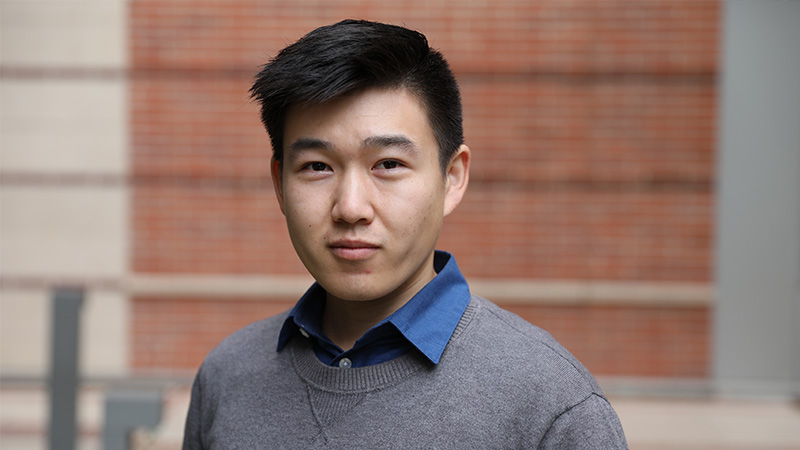UCLA Engineering Student Earns NASA Grant for Research in Heat Transfer Technology

UCLA Samueli
UCLA Samueli Newsroom
Zachary Wong ’20, M.S. ’22, a mechanical engineering Ph.D. candidate at the UCLA Samueli School of Engineering, received a 2022 NASA Space Technology Graduate Research Opportunities grant for his research on oscillating heat pipes, which disperse heat to regulate system temperatures.
The technology, which has major applications in aerospace, electronic devices and more, could support higher-power electronics, making way for lower-cost satellites and advanced scientific exploration.
NASA selected Wong as one of its 49 awardees with an $80,000-per-year grant to fund his research, which may be renewed for up to four years. He will also be paired with a NASA mentor who can introduce him and his research to the larger technical community.
Wong’s interests in science, technology, engineering and math derive from his passion for reading. Growing up, Wong often visited local libraries where authors such as Issac Asimov, C.S. Lewis, and Orson Scott Card inspired him to pursue a career that would help bring some of the things he dreamt about to reality.
“A lot of STEM is rooted in technical knowledge, but also benefits from a healthy dose of creativity and imagination,” Wong said. “I love how it can serve as a bridge between so many disciplines and people.”
Wong brought this creativity into his undergraduate mechanical engineering studies at UCLA, during which he participated in many student-led organizations, including 3D4E’s drone team, Bruin Racing’s hyperloop maglev team and the Renewable Energy Association.
During his undergraduate studies, Wong didn’t seriously consider pursing a graduate degree until his junior year when he took Mechanical and Aerospace Engineering 105D: Transport Phenomena with adjunct professor Webb Marner. Marner’s research expertise and his approach to teaching helped solidify Wong’s plan to pursue a career in research and teaching.
“Dr. Marner’s command of the classroom and material as well as his kind heart make him one of the best professors I’ve ever had,” said the now first-year doctoral student. “Finding that subject and an early mentor narrowed my focus towards graduate school, giving me a tangible example of what meaningful research and education could look like in tandem.”
With his research focus determined, Wong joined the Morrin-Gier-Martinelli Memorial Heat Transfer Laboratory in the summer after his junior year at UCLA, where he studied hydrodynamic stability under the late distinguished professor emeritus of mechanical engineering Ivan Catton. In his senior year, Wong joined the Nano Transport Research Group led by mechanical and aerospace engineering professor Timothy Fisher.
“I’m truly grateful for the opportunity and I hope to mirror some of what NASA has done
— contribute meaningful work while encouraging budding scholars to reach for heights unknown,” Zachary Wong said.
It was in Fisher’s lab where Wong was exposed to a variety of heat transfer research and when it came time to apply to graduate school, Wong decided he wanted to stay at UCLA to continue his research with Fisher.
“Working alongside his group is exciting and I appreciate how broadly our collective expertise extends,” Wong said of Fisher who is his Ph.D. advisor.
The graduate studies at UCLA have provided Wong with many opportunities to delve into his interests in both research and course instruction, including his serving as a teaching assistant for MAE 105D, the class that sparked his pursuit of a graduate career.
Already a double Bruin with both a bachelor’s and master’s from UCLA, Wong said he is especially inspired by the school’s longstanding leadership in the field of heat transfer.
“If you talk to any heat transfer engineer at UCLA, they’ll probably tell you at some point that Boelter Hall was named after one of our own — Llewellyn M. K. Boelter, a long-time thermal engineer and the first dean of UCLA’s school of engineering,” Wong remarked. “Not many people know it, but UCLA has a rich history of excellence in heat and mass transfer that continues to this day.”
Wong considers many UCLA professors as his mentors and says that his research on oscillating heat pipes (OHPs) has garnered support from NASA for the pipes’ applications in cooling space electronics.
While there are many methods to thermally manage electronic systems, OHPs show promise for their simple, cost-effective design that typically consists of a serpentine loop of capillary channels milled into a metal plate. The channels are then sealed airtight, evacuated, and partially charged with a working fluid. Their light weight and scalability also make oscillating heat pipes especially attractive for aerospace applications, where reduced weight and mass can be crucial. Furthermore, OHPs generally have consistent performance no matter their gravitational environment.
With the space industry growing rapidly, Wong says he hopes to see improved oscillating heat pipes help space technologies reach new heights and make new discoveries.
“Space is breathtakingly beautiful and complex, and NASA continues to unlock pieces of that for the world to enjoy by applying diligent teamwork, ingenuity and passion toward its constant challenges,” Wong said. “I’m truly grateful for the opportunity and I hope to mirror some of what NASA has done — contribute meaningful work while encouraging budding scholars to reach for heights unknown.”
